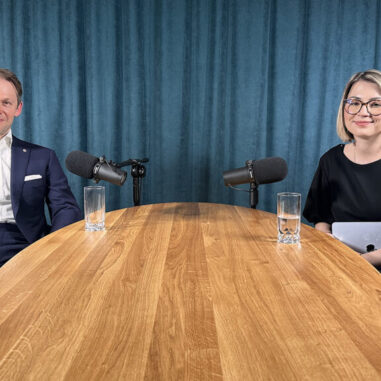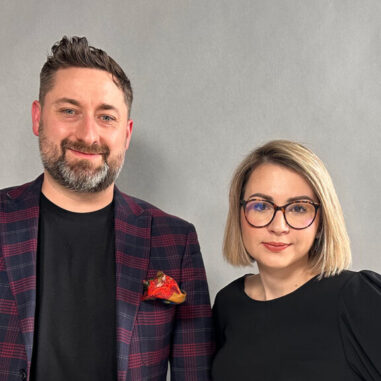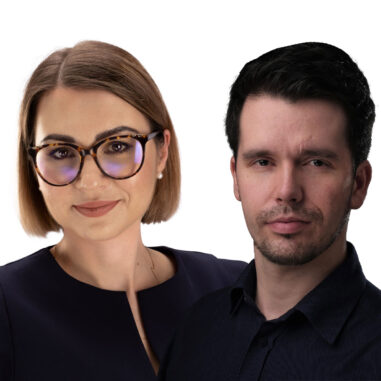
The guy at the urologist: between scalpel and shame. Episode 3
The latest episode of the podcast 'Firstly the Patient', in which host Monika Rachtan talks to Professor Jakub Dobruch, urologist, is now available. The main topics of the episode are: the importance of prevention in urology, why men fear visiting the urologist and the role of women in men's health.
Every average guy in our audience is not only embarrassed by the urologist, but usually comes to the surgery with a companion - his wife or daughter. It seems that treating the urologist's office as a place of fear and embarrassment is a universal trait for many men, regardless of age or status.
With lightness and humour, Professor Dobruch dispels many myths about urology. He emphasises the importance of prevention and regular examinations, especially for men over 50. He also talks about the latest developments in this field of medicine and how technology has improved the diagnosis and treatment of urological diseases.
One of the most important topics covered in the interview is the role of women in men's health. Professor Dobruch notes that women often initiate men's visits to the urologist, prompting them to take steps to look after their health. She also confirms the observation that men often need support to break down barriers and seek medical help.
The podcast 'Patient First' is available on many platforms, including Spotify, Apple Podcasts and Google Podcasts. We invite you to listen to this inspiring and highly relevant episode.
Transcription
Jakub Dobruch
Good afternoon, ladies and gentlemen. My name is Jakub Dobruch. Although I am a urologist, in my professional life I am the head of the Department of Urology at the Centre for Postgraduate Education. I am also active within the Polish Logical Society. Outside of work, I love cycling, especially when I can listen to audiobooks at the same time. I admit that I have listened to more books in recent years than ever before. This is thanks to audiobooks and my love of cycling. In addition to this, I do running, skiing and love spending time with my family.
Monika Rachtan
Professor, a warm welcome to my programme "Patient First". Thank you for accepting my invitation. Today we are going to talk about men's health. When I was preparing for this programme, I asked my husband if he was afraid of visiting a urologist. My husband, because of my profession, is familiar with many aspects of medicine, so he replied that he was not afraid of this examination. However, when I spoke to female friends who have husbands in their 30s and 40s, most of them expressed fear of visiting the urologist. It is often said that women are the ones who bring their husbands to the urologist's office. Is this true?
Jakub Dobruch
It is true that many times men come to the surgery accompanied by their wives, partners or daughters. It seems that women want to be present during visits to support their loved ones. I am not sure how it is with gynaecologists, but I notice that women want to participate in the diagnosis and treatment of their partners.
Monika Rachtan
I wonder if women attend gynaecological appointments together with men more often. It seems to me that the woman goes to the first appointment alone and only later, when they are planning to have offspring, does the man join her.
Jakub Dobruch
What about later visits?
Monika Rachtan
I think the later visits are rather individual, unless there are serious health problems. But since we're on the subject, I'd like to know if it's really beneficial for a man and a woman to visit a urologist, as I read on a certain website?
Jakub Dobruch
Such meetings are beneficial because the man is often faced with a therapeutic choice. In medicine, there is not always a clear-cut solution. Explaining the problem to the patient's relatives as well can help to make an informed decision.
Monika Rachtan
I also think that women are more open during discussions and provide more information during the first visit than men. The decisions made in the urologist's office affect not only the patient's life, but also the life of their partner.
Jakub Dobruch
I agree. However, in my practice, focusing mainly on oncology, the most important aspect is patient life expectancy. Quality of life is important, but the diagnosis of cancer dominates conversations with patients.
Monika Rachtan
Why are men afraid to visit the urologist?
Jakub Dobruch
Many men are apprehensive about a prostate examination. This examination is not painful, but can cause discomfort. Younger men rarely need this examination.
Monika Rachtan
Does every visit to the urologist require this test?
Jakub Dobruch
No, if a young man comes in with a problem unrelated to the male genitalia, such an examination is not necessary.
Monika Rachtan
Why is this study being conducted at all?
Jakub Dobruch
The test is used to assess the prostate gland, which is responsible for a man's reproduction. Prostate cancer is the most common malignant tumour in men in Poland. Thanks to this examination, we can detect it in good time.
Monika Rachtan:
When you mentioned colonoscopy, did you wonder whether you should consult a urologist? We often wonder if our fears are justified, but sometimes the very first medical visit can dispel our doubts. The diagnostic process does not have to be long and complicated. Mr Professor has a clear task - the patient comes in, talks to the doctor, who assesses the condition based on a history and examination.
Jakub Dobruch:
The ideal model for a doctor's visit is one that I have had the opportunity to observe in New York. The patient is diagnosed in one appointment and an ultrasound is performed at the same time. Are you familiar with the current medical structure and system? If there is a need, examinations are performed immediately.
Monika Rachtan:
Yes, that's right.
Jakub Dobruch:
For local diagnosis, the urinary bladder is examined using a thin, flexible instrument. In Poland, there are also emerging opportunities to perform such examinations in a single appointment, allowing an accurate assessment of the urinary system.
Monika Rachtan:
The professor mentioned an issue and I was reminded that this is an organ in which cancer can develop. If I remember correctly, it is about one of the most common cancers.
Jakub Dobruch:
Yes, it is about bladder cancer, which is the most common cancer of the urinary tract and one of the main urological cancers.
Monika Rachtan:
Understanding. What symptoms should worry a man and prompt him to see a urologist?
Jakub Dobruch:
The main symptom of bladder cancer is blood in the urine. If this is the case, a visit to a specialist is necessary. If a man notices problems with urination, pain in the flank area, he should consult a doctor. However, the most common cancer we have discussed, prostate cancer, most of the time does not give clear symptoms.
Monika Rachtan:
I would like to emphasise that our programme is aimed at patient education. You mentioned that a basic examination can be ordered in primary care. Who should come in for a referral for such a test? Are there any age or genetic criteria?
Jakub Dobruch:
It's true, every man should take care of his health. At a certain age, he should visit his GP and ask for a referral for an examination. As for age, more and more studies suggest that the first examination should take place around the age of forty.
Monika Rachtan:
This is important information. So if a man in his mid-forties has normal results, what can he do to minimise his risk of developing prostate cancer in the future?
Jakub Dobruch:
Men should lead an active lifestyle, maintain a healthy diet and avoid excessive consumption of processed foods. Regular physical activity and a healthy diet can significantly reduce the risk of many diseases, including cancer.
Monika Rachtan:
This is very valuable information.
Jakub Dobruch
We now have ample evidence that vegetables are rich in substances that neutralise free radicals. These toxins are formed by the liver's processing of various foods. Vegetables also contain vitamins, trace elements and micronutrients.
Monika Rachtan
I would like to ask the Professor about diet. I quickly realised that we are both vegetarians. I wonder how many of my interlocutors do not eat meat either. I am glad that the Professor mentioned his diet. I would also like to inform our listeners that we will soon be cooking healthy dishes for the barbecue season together with an expert. I want to show that you can prepare tasty vegetarian dishes for the barbecue. But let's get back to oncology topics. I hope the Professor is not angry that we have strayed from the topic.
Jakub Dobruch
No problem.
Monika Rachtan
I would like to ask if it is a good idea to visit a urologist's office for preventive care, even if we do not have any complaints. If so, at what age should a man attend his first follow-up appointment?
Jakub Dobruch
Definitely worth it. I encourage men to see their urologist regularly. I am noticing more and more patients in my practice, mainly over the age of 40. Many men at this age notice changes in their bodies and want to understand the causes.
Monika Rachtan
I would like you to tell me about the surgical treatments available for prostate cancer. Which one is best for the patient and which one is most commonly performed?
Jakub Dobruch
There are three main surgical methods for treating prostate cancer. The traditional open method, laparoscopic surgery and robotic surgery. Each of these has its advantages. Personally, I use robotic surgery most often. However, it is the experience of the surgeon, rather than the specific method, that is crucial to the success of the operation.
Monika Rachtan
Thank you, Professor. I would like to emphasise the importance of regular examination and follow-up with a specialist, regardless of the method of treatment.
Jakub Dobruch
You can easily sense things, although they are not always verbal. There is a certain finesse in surgery. It can be approached elegantly or less elegantly.
Monika Rachtan
Professor, I would like to ask from a practical patient point of view. In terms of centres that operate with a robot?
Jakub Dobruch
You can find out from the National Health Fund which centres have received funding for this operation. The patient can check this. However, the National Health Fund does not tell you which centres perform these operations on a commercial basis. Public centres have to provide data if they want to receive funding for this operation.
Monika Rachtan
It is a question of transparency. I would like to ask, what happens to the patient when surgical treatment for cancer is inadequate?
Jakub Dobruch
If, after surgery, we see signs of a potential metastasis that was not visible before surgery, this may indicate the presence of residual cancer. There are several scenarios that can develop afterwards. But if we see biochemical recurrence in some patients after a certain period of time, we treat this as a treatment failure.
Monika Rachtan
My understanding. So the urologist also runs cancer treatment programmes?
Jakub Dobruch
Yes, in drug programmes we have access to many modern forms of systemic therapy and urologists also participate in these programmes.
Monika Rachtan
I would like to ask about surgery related to kidney cancer. What are the differences between a urologist and a neurologist in the context of treating kidney problems?
Jakub Dobruch
A neurologist deals with internal diseases from a pharmacological treatment perspective. A urologist is a surgeon who specialises in diseases of the urinary tract and male genital organs, including kidney diseases treated surgically.
Monika Rachtan
So to simplify, a neurologist is a doctor of medicines and a urologist is a surgeon. What are the symptoms of kidney cancer that should arouse our attention?
Jakub Dobruch
Kidney cancer is not very common, but it is not rare either. Many cases of kidney cancer are detected incidentally during ultrasound examinations. Therefore, it is worthwhile to have regular preventive examinations.
Monika Rachtan
Is it worth bringing previous test results to the doctor?
Jakub Dobruch
Definitely yes. Assisting the doctor by providing previous test results can help in a more accurate diagnosis.
Monika Rachtan
Do men feel uncomfortable talking about their problems at the doctor's surgery?
Jakub Dobruch
I would not like to use the word 'ashamed', but it is difficult to talk about intimate matters. It requires trust and the right atmosphere in the doctor's office.
Jakub Dobruch:
Obviously, the best possible therapeutic effect should be sought. This can be achieved in many ways, not necessarily pharmacological or surgical. We are committed to this, but certain limitations and problems arise. Everyone is trying to eliminate them. A good example is the Swedish system used in Scandinavia. Doctors there have more time to talk to the patient and consult than in Poland.
Monika Rachtan:
The professor wanted to convince our audience that a doctor would not judge a patient who talks about erectile problems. I discussed this with a psychiatrist and we imagined a situation in a small town where everyone knows each other. The patient might fear that the doctor would know about his problems. But I believe that 99% doctors will not judge such a man. They just want to help him.
Jakub Dobruch:
Exactly, this is medical confidentiality. We forget about the patient's personal information after leaving the surgery. In the medical community, we talk about cases, but not about the patient's personal data. If a doctor does not exercise discretion, he should not be a doctor.
Monika Rachtan:
Professor, what do you mean by the humanisation of medicine from the perspective of a urologist?
Jakub Dobruch:
For me, humanism in medicine means treating the patient as a whole, not just as a disease. It is treating the human being subjectively, taking into account all aspects of his or her life. The doctor should also be a psychologist.
Monika Rachtan:
I agree.
Jakub Dobruch:
The psychologist has to convince the patient of the proposed treatment. I know that what I am proposing is good for the patient. I have to build the right relationship with him to guide him through the whole treatment process and to take care of his wellbeing.
Monika Rachtan:
Professor, I wish all patients met doctors with an approach like yours. Thank you very much for the interview.
Jakub Dobruch:
Thank you very much for your kind words. It was a pleasure to speak to your editor.
Previous episodes

From tabby to urologist
Ever wondered why the average guy usually goes to the urologist with his wife or daughter? Is it a matter of companionship, or do they need an interpreter in the tricky world of men's health? This and many other topics concerning men's health will be addressed in the latest episode of 'Patient First', featuring urologist Professor Jacob Dobruch.

Understanding the menstrual cycle is not just a girls' problem. Episode 2
The second episode of the podcast 'Patient First' is now available to listen to.

Education and empathy: the key to women's health - interview with Dr Kamil Cichy
We will be publishing the second episode of the podcast 'Firstly the Patient', hosted by Monika Rachtan, on Wednesday 7 June. Our guest will be Dr Kamil Cichy, a gynaecologist and obstetrician from Slupsk. Dr Cichy is not only an experienced doctor, but also an active educator of the public.




